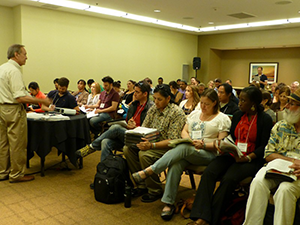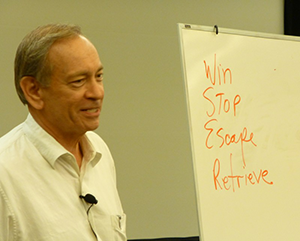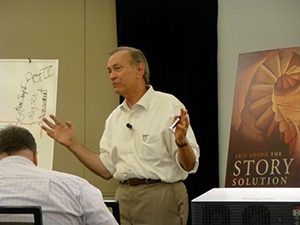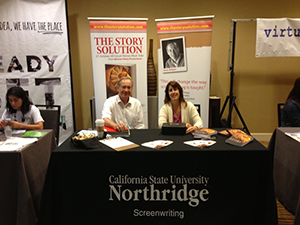"Hunger Games" heroine Katniss Everdeen returns to the big screen this weekend with the second installment in the young adult fantasy trilogy, "Catching Fire."
For months, bloggers have been anticipating Sam Claflin's portrayal of Finnick Odair and buzzing about how Katniss' face-off with President Snow and the Victory Tour will translate to the screen.
Young adult book-to-film adaptations are a steady draw for viewers: J.K. Rowling has signed on for yet more Harry Potter films, and a new class of YA novels is set to be adapted to the screen starting in 2014: Veronica Roth's "Divergent," John Green's "The Fault in Our Stars," James Dashner's "The Maze Runner" and Gayle Forman's "If I Stay," to name a few.
With loyal, built-in fan bases for these best-selling books, the hype comes as no surprise. After all, the idea behind movie adaptations, besides franchise-building, is to give readers a new opportunity to walk through their favorite world.
"It's a chance to fall in love with the characters all over again when readers can see the books come to life," Erin Setelius of the YA Book Addicts blog said. "It's like a little reward for loving the books."
Film adaptations are a balancing act of fan expectations and filmmaker priorities -- especially when fans have grown up with a book series or character. If a movie deviates too far from the book's plot, changes characters or fudges dialogue, readers can quickly lose faith in it.
So what is the recipe for a well-made YA book-to-film adaptation? Authors and filmmakers agree it doesn't include putting every single page on the screen.
The evolution of young adult fiction
Preserving the soul
"When I saw the first 'Twilight' film, I came out of that with butterflies in my stomach," Forman said. "I felt exactly like I did reading the book, and that's what you want from the film. With so many adaptations happening right now, it speaks to that emotional resonance of YA books and how that translates to the screen."
Stay in touch!
Don't miss out on the conversation we're having at CNN Living. Follow us on Twitter and Facebook for the latest stories and tell us what's influencing your life.
One of the biggest challenges of adapting a book for the screen is deciding what stays, what goes and how those pages will translate in a film while maintaining the essence and emotional ties of the story, authors say.
"I think 'Harry Potter and the Prisoner of Azkaban' is one of the best adaptations of YA literature we've ever had," said author and filmmaker Bryan Young. "Director Alfonso Cuarón was the best at taking the spirit of what the book was and boiling it down. He created a new look and feel for the Harry Potter movies that set the tone going forward in a way that no one else really did."
Young said a skillful culling of the book's themes also helped the first "Hunger Games" story translate easily to film. Director Gary Ross made a movie that newcomers could appreciate, while discarding parts of the book that didn't make sense on the screen.
'Harry Potter' producer talks about upcoming spinoff
Forman has signed on to be executive producer of the adaptation of her popular novel "If I Stay." She hopes to be a conduit between her readers and the film's producers, making sure that key scenes, players and touchstones are included.
Casting is an essential part of the equation, too. Fans want to believe in the actors portraying their favorite characters, from appearance to personality.
"As a reader, you have ideas of characters in your head," Forman said. "But for my story, everyone has been so perfectly cast. It's like someone reached into my head and pulled out Mia in the form of Chloe Moretz. If I'm feeling this way, I think the readers will feel that way too."
'Hugo' author leaves readers 'Wonderstruck'
Martin Scorsese and his team captured all the right aesthetics for \
Martin Scorsese and his team captured all the right aesthetics for "Hugo."
Brian Selznick didn't have a formal role in the adaptation of his children's book, "The Invention of Hugo Cabret," but he believes "Hugo" was still a faithful, loving production by director Martin Scorsese and screenwriter John Logan. Scorsese and the entire film crew read and had copies of the book on set at all times, using Selznick's drawings as storyboards.
"If you have a director who loves the original material and a writer who is respectful, you can find that middle ground," Selznick said. "They can maintain the core of what makes it work as a book, yet have something only the cinema can bring to it."
The young adult books that changed our lives
Negative influences
Before the rise of Internet culture, films were made in a relative vacuum, and potential fans didn't know much about a movie until the trailer released. Now, movie headlines are created before the script is even finished, and fans aren't afraid to share their opinions on the script, casting and plot.
"You have all of these voices who think they are absolutely right," Young said. "Then the filmmaker has to do their job and take all of this into account. It's not fair to expect them to work as an artist under those conditions."
Marketing has also taken on a comparative aspect. Selling a dystopian tale such as "Divergent" as the next "Hunger Games" creates the wrong expectations going into the movie, Setelius said.
This could be a contributing factor to the lackluster box office numbers for other YA adaptations outside of the "Harry Potter," "The Hunger Games" and "Twilight" franchises. But the tide could turn with hype over upcoming films like "Divergent" and long-awaited adaptations such as Lois Lowry's "The Giver."
"I do think that when a YA book goes to the movies, it's sort of polarizing," said YA writer Margaret Stohl. "You're going to endure a storm one way or another: are you like 'Twilight,' or 'Hunger Games'? But in truth, those movies also did a lot for YA books being adapted."
Stohl is co-author with Kami Garcia of the "Beautiful Creatures" series. The first book became a film in March 2013, and Stohl's YA novel "Icons" has also been optioned by Alcon.
The "Beautiful Creatures" movie, based on a 600-page Southern Gothic YA novel, drew mixed reviews from fans. But the movie helped to bring in 4 million new readers this year, Stohl said.
List: YA books scheduled to hit the screen
Doing it right
Stephen Chbosky adapted his beloved novel, "The Perks of Being a Wallflower," to the screen in 2012. That was 13 years after the book debuted.
Fans fell in love all over again with the coming-of-age tale of shy teenager Charlie, while new viewers empathized quickly. Chbosky's challenge was to faithfully preserve the boy's story without reciting the book triumph for triumph, humiliation for humiliation.
A 'Wallflower's' lasting impact
"I think that the process of turning 'Perks' into a movie was the most gratifying and challenging work I've ever done professionally," he said. "I had to do a real adaptation -- I couldn't just film the book. It was a real balancing act to simultaneously be emotionally very inside the piece and at the same time always be outside of it to keep it on the train tracks."
The famous Fort Pitt tunnel scene in \
The famous Fort Pitt tunnel scene in "Perks" worked even better on screen.
He wrote a version of the screenplay including almost every detail of the book. It gave Chbosky a chance to self-edit, cutting back on small details or scenes that didn't focus on central characters.
Chbosky wanted to maintain the audience of his readers, both from 1999 and now, bringing teens and parents together around issues that kids of all generations face.
It's something that YA film adaptations continue to do, and Chbosky is hopeful that Forman's upcoming film will have a similar impact: "I do believe that these books and these movies can change lives."
Source: Edition.cnn.com/2013/10/22/living/young-adult-book-movie-adaptations








